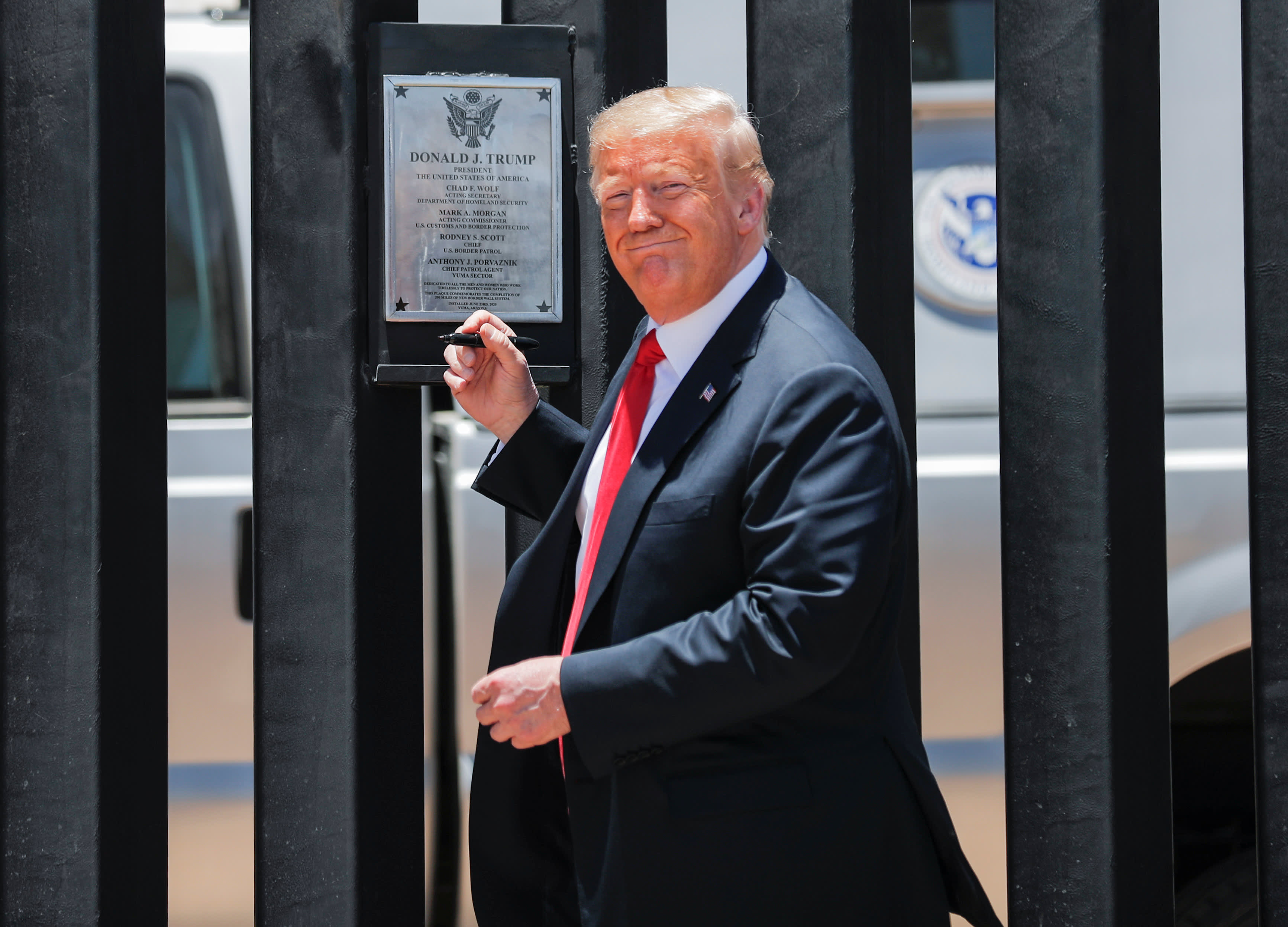
U.S. President Donald Trump talks with U.S. Border Patrol Chief Rodney Scott as he tours a section of the U.S.-Mexico border wall in San Luis, Arizona, U.S., June 23, 2020.
Carlos Barria | Reuters
The Supreme Court said on Monday that it will hear two cases related to President Donald Trump’s efforts to limit migration into the U.S. from Mexico and other Latin American countries.
One case concerns whether the Trump administration’s use of disputed military funds to construct a portion of a border wall along the U.S.-Mexico border violated the law.
Another involves his administration’s “remain in Mexico” policy for those seeking asylum in the United States.
The Justice Department asked the top court to hear appeals in both cases after suffering defeats in lower courts. The announcement from the justices was made in an order. Decisions in the cases are expected by the end of June.
The court’s action comes just 15 days before the election between Trump and his Democratic rival former Vice President Joe Biden and amid a confirmation battle over Judge Amy Coney Barrett, who is expected to be confirmed to the top court by the Senate later this month.
Biden has pledged to reverse a number of Trump administration immigration polices and accused him of waging “an unrelenting assault on our values and our history as a nation of immigrants.”
The border wall case stems from the Trump administration’s dispute with Congress in 2018 over funding for the barrier, which helped cause the longest government shutdown in U.S. history.
After lawmakers granted only about $1.4 billion of the nearly $6 billion the White House had requested, Trump transferred an additional $2.5 billion that had been allocated to the Department of Defense for use in wall construction.
The Sierra Club and a border area advocacy organization sued over the use of the funds, and a federal district court blocked the transfer in 2019.
The Supreme Court, however, allowed the administration to move forward with construction of the wall in July of 2019 while the administration pursued an appeal at the 9th U.S. Circuit Court of Appeals. The federal appeals court ultimately sided against the administration.
The other case concerns the Department of Homeland Security’s “Migrant Protection Protocols” implemented in January of 2019.
Under the policy, asylum seekers who travel through Mexico to seek asylum in the U.S. are returned to Mexico for the duration of their removal proceedings. Those challenging the policy argue that the government returns migrants to parts of Mexico that are among the most dangerous places in the world.
The Innovation Law Lab, an immigration nonprofit, challenged the policy and a federal district court ordered the government to halt it in April 2019.
The 9th U.S. Circuit Court of Appeals substantially upheld the lower court ruling, though that decision was reversed in in March when the Supreme Court allowed the administration to temporarily reinstate the policy pending appeal.
The American Civil Liberties Union, a national civil rights organization, is representing the challengers to both Trump administration efforts. In statements released on Monday, attorneys for the group noted that lower courts had ruled against the administration and called on the Supreme Court to do so as well.
“Everyone knows that Trump failed to get Congress to fund his xenophobic wall obsession, and every lower court that has considered the case has found that the President has no authority to waste billions of taxpayer dollars on construction,” Dror Ladin, a senior staff attorney with the ACLU’s National Security Project, said in an email.
Judy Rabinovitz, an ACLU attorney and lead counsel in the lawsuit challenging the “remain in Mexico” policy, said that asylum seekers “face grave danger every day this illegal and depraved policy is in effect.”
“The courts have repeatedly ruled against it, and the Supreme Court should as well,” Rabinovitz said.
The Justice Department did not immediately return a request for comment.
This is breaking news. Check back for updates.



